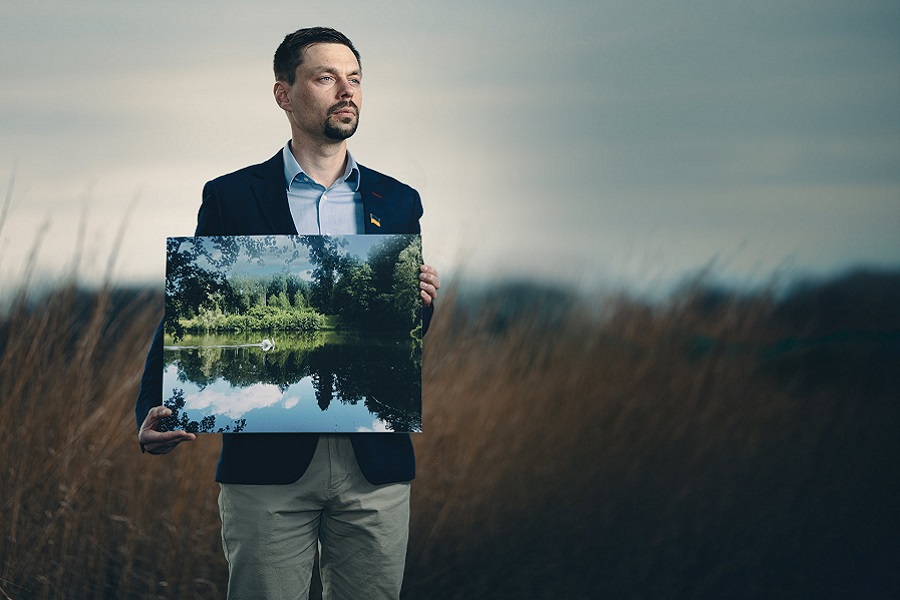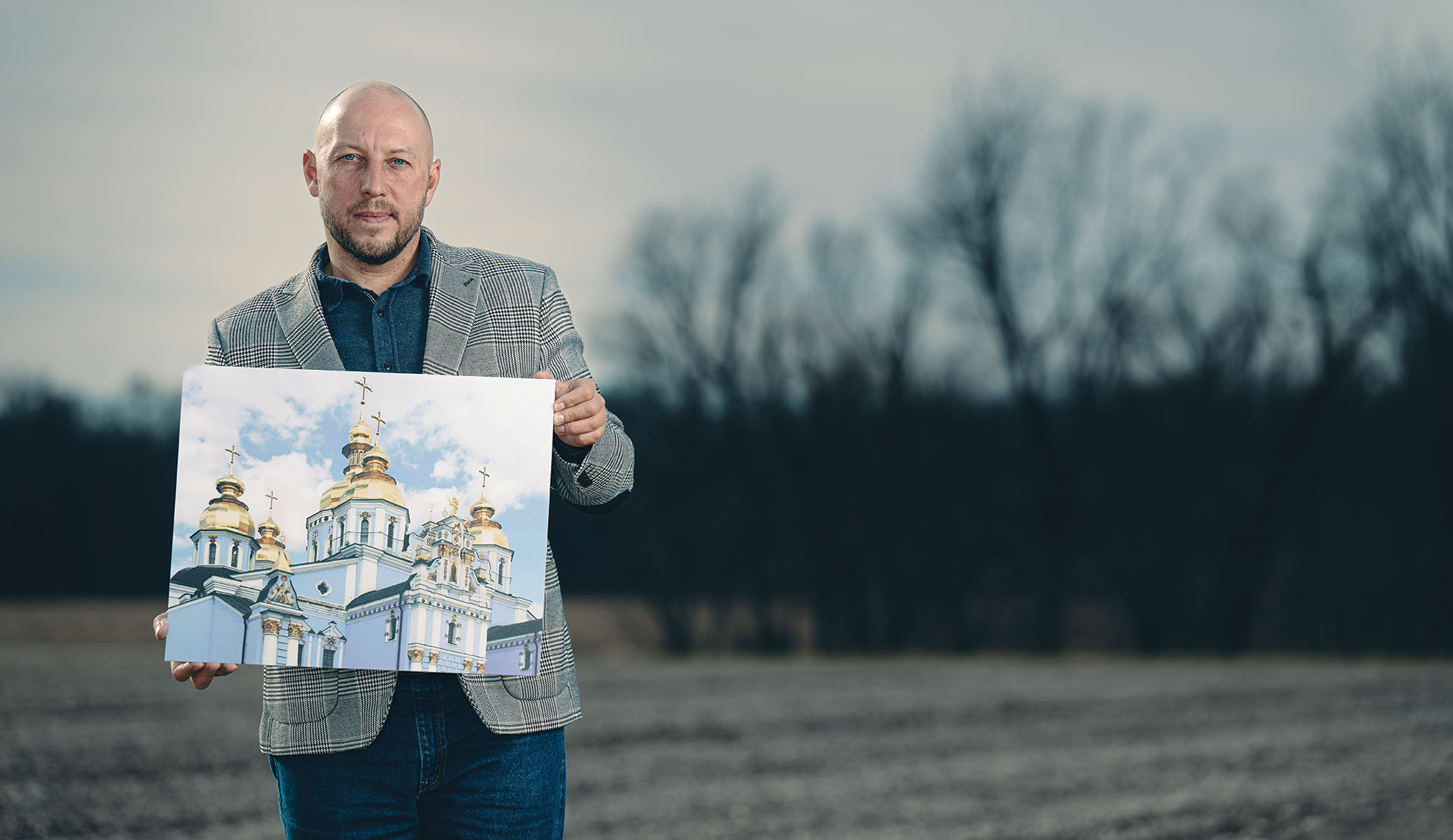and Refuge
in a Time of
Conflict
BY ASHVINI MALSHE
PHOTOGRAPHY BY CHARLES JISCHKE
Maksym Chepeliev holds a photo of a lake in the Trostianets Dendrological Park located 125 miles east of Kyiv.

BY ASHVINI MALSHE
PHOTOGRAPHY BY CHARLES JISCHKE
Maksym Chepeliev, research assistant professor at the Center for Global Trade Analysis (GTAP) in the College of Agriculture, knows the dissonance of trying to comprehend the lives of loved ones thousands of miles away. When Russia invaded his home country of Ukraine on February 24, 2022, the separation between Chepeliev and his extended family living there seemed to expand.
"It’s impossible to understand their situation,” he says. “Mentally, we read about things and talk to relatives, and they explain the situation. But without being there physically, it’s hard to grasp.”
SHIFTING RESEARCH FOCUS
Chepeliev and his wife and daughter have been part of the Purdue community since 2016. Initially shocked by news of the Russian invasion, he soon felt motivated to use his expertise to help Ukraine.
Before joining Purdue, Chepeliev was a research officer at the Institute for Economics and Forecasting at the National Academy of Sciences of Ukraine, where he received his PhD in economic modeling.
Based on his interest in applying his expertise on a global scale, specifically to interactions across different countries and policies, he sought out GTAP at Purdue. When the war began, Chepeliev says, “I was in a good position to see what policy solutions could be implemented to help address the impact of this conflict.”
His earlier research focused on global trade and finding a pathway to green energy sources in Ukraine and worldwide. Starting in February 2022, that evolved into studying the implications of energy disruptions and energy sanctions, as well as the economic impacts of war on the global supply chain.
In the past two years, Chepeliev has coauthored several publications with colleagues from GTAP and the World Bank on these topics. He and his World Bank colleagues, including Maria Filipa Seara e Pereira, now a Purdue PhD student in agricultural economics, described how the Russian invasion of Ukraine continues to disrupt the global supply chain, including fossil fuels, wheat, oil and fertilizer supplies.
They found that while consumers worldwide suffer as a result, those in economically underdeveloped countries feel the impact most. “The adverse implications of war in Ukraine are particularly negative in countries of lower income levels, or those countries with lower net agricultural exports and higher shares of food expenditures. This means that a larger share of their income is spent on food,” Chepeliev says.
Reducing trade barriers can improve access to food for these households, in turn improving global food security.
In 2022 Chepeliev also testified in front of the European Parliament ahead of a member vote on a resolution, later adopted, that would apply strict sanctions to Russian energy exports, the main source of their foreign trade.
Chepeliev and his collaborators hope that substitute commodity suppliers and alternative energy sources could reduce the negative impacts of these sanctions on the rest of the world, Ukraine included.
In a 2022 article he and his co-authors, Purdue agricultural economists Thomas Hertel, distinguished professor and executive director of GTAP, and Dominique van der Mensbrugghe, research professor and director of GTAP, also point out that these energy sanctions, which include cutting off Russian fossil fuel exports, could help the EU reach its 2030 goal to cut greenhouse gas emissions by 55 percent.
More recently, in a series of studies with colleagues from Ukraine, Chepeliev also showed that while the war has taken a major toll on the economy, it also provides an opportunity to rebuild the country in a sustainable way, relying on affordable, carbon-free energy technologies.

FINDING REFUGE AT PURDUE
The war’s impact on Ruslan Buriak, visiting scholar of agricultural economics, was more immediate. He first heard about the College of Agriculture’s global reputation as an undergraduate in Kyiv, when a friend studied at Purdue in 1996.
Buriak went on to receive his PhD in economics at the National University of Life and Environmental Sciences (NULES) of Ukraine, studying quality management systems in agricultural sector enterprises. He hoped that one day he’d have the opportunity to come to the United States.
He has held positions as head of the Department of Marketing and International Trade at NULES and consultant for the Ukrainian Association for Excellence and Quality. But with the invasion, Buriak and his family were more motivated than ever to leave Kyiv.
“When Russia’s full-scale military aggression against Ukraine began, I wanted to find the opportunity to continue my scientific research in another country,” Buriak says. He researched Purdue’s Department of Agricultural Economics and found a paper by Michael Brzezinski, retired vice president of global partnerships and programs, about Purdue’s Ukrainian Scholars Initiative.
Deeply troubled by the grim realities of the days that followed, Buriak and his family started the process of relocating to West Lafayette, first moving to Poland to obtain U.S. visas. They arrived on campus in October 2022 and soon found refuge in the Purdue community.
At Purdue, Buriak collaborates with Brady Brewer and Carson Reeling, both associate professors of agricultural economics, on research related to agricultural marketing, food safety and the poultry industry. In his current project, Buriak is analyzing how changes in income impact poultry consumption in Ukraine. Prior to the war, Buriak says, income levels in Ukraine were increasing, with poultry consumption rising significantly — faster in Ukraine than in other countries.
Buriak says that investment in the Ukrainian poultry sector may be insufficient to meet the growing demand. Poultry is more affordable than beef and pork, he explains, with a high production rate, although 30% of poultry produced is exported abroad. The growth in demand continues despite the overall decrease in real incomes of the Ukrainian population due to the ongoing war.
Buriak and his collaborators predicted that poultry production would increase 1.1% to 1.7 million tons in 2023, with continued growth in 2024. To meet this demand, Buriak proposes several solutions, including the adoption of energy-efficient technologies to reduce poultry production costs and a long-term focus on exporting poultry products to the EU following Ukraine’s application for EU membership.
He hopes the proposed measures will support sustainable development in agriculture, he says. “This, in turn, will have a positive effect on improving the state of food security in Ukraine.”
UNCERTAINTY AHEAD
While many factors related to Chepeliev’s research projects remain uncertain during the war, he looks to the future and remains motivated to help the world, and his home country, mitigate the effects of the ongoing conflict.
“The resilience of the people in Ukraine is incredible. Although the people affected have adjusted to it, the impact is something unimaginable,” Chepeliev says.
And as the Ukrainian Scholars Initiative continues, Buriak is grateful. “Purdue University gave me the wonderful possibility of continuing my scholarly work and my family and I comfortable and safe conditions to live in during the period of war in Ukraine,” he says.
THE UKRAINE SCHOLARS INITIATIVE, a Purdue University program launched in March 2022, provides Ukrainian scholars an opportunity to continue their academic pursuits at Purdue during the ongoing Russian invasion. A 2023 grant from the Indianapolis-based Heritage Foundation extended the program to May 2024.
Banner Photo: Maksym Chepeliev holds a photo of a lake in the Trostianets Dendrological Park located 125 miles east of Kyiv.
